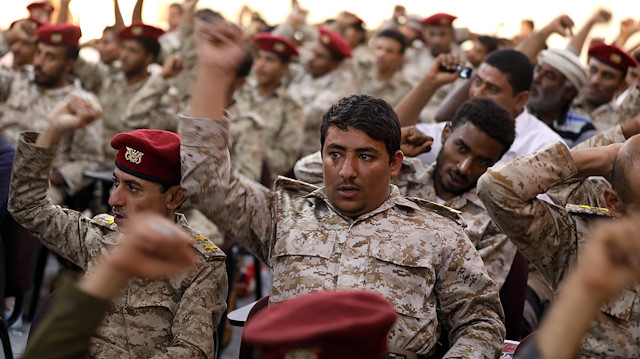

Army officers and soldiers who have defected from the ranks of Yemeni government forces shout Houthi slogans during a ceremony held by the Houthis in Sanaa, Yemen December 29, 2019. REUTERS/Khaled Abdullah
Aid to Houthi-controlled Yemen will be scaled-down next month in a highly unusual move because donors and humanitarians can no longer ensure it is reaching those who need it, sources told Reuters.
Humanitarian sector sources say Houthi authorities in northern Yemen, home to most of the vulnerable Yemenis who rely on aid, are obstructing efforts to get food and other assistance to those in need, to an extent that is no longer tolerable.
"The operating environment in north Yemen has deteriorated so dramatically in recent months that humanitarians can no longer manage the risks associated with delivering assistance at the volume we currently are," a senior UN official said.
Unless things improve, humanitarians and donors will have "no choice" but to reduce assistance, the official said. This would include curtailing some food aid overseen by the United Nations World Food Program (WFP), which feeds more than 12 million people a month.
The United Nations describes Yemen as the biggest humanitarian crisis on earth and says millions of people there live on the verge of starvation.
The Supreme Council for the Management and Coordination of Humanitarian Affairs (SCMCHA), a Houthi body formed in November to oversee aid, did not respond to a request for comment.
Aid agencies have for the past year publicly and privately complained of worsening operating conditions, lack of travel permits and other access restrictions which have left workers in northern Yemen "exasperated", in the words of one agency employee, and unable to deliver to full capacity.
"At high levels this has left the agencies, NGOs and donors asking: can we continue like this or do fundamental changes need to be made?" said another source familiar with the discussions between donors and aid distributors.
No donors, U.N. agencies or charities have yet made any public announcement of aid reductions. Three sources told Reuters the reductions would likely begin at the start of March, following consultation with donors this month.
Yemen has been mired in conflict since the Iran-aligned Houthis ousted the government of President Abd Rabbu Mansour Hadi from the capital Sanaa in late 2014. A Saudi-led military coalition intervened in 2015 to try to restore Hadi.
"No one wants to walk away from a crisis, certainly not a crisis as big as the one in Yemen, but humanitarians have to adjust what we are doing based on the risks we are facing," the U.N. official said.
#Yemen
#Houthi
#Saudi Arabia

